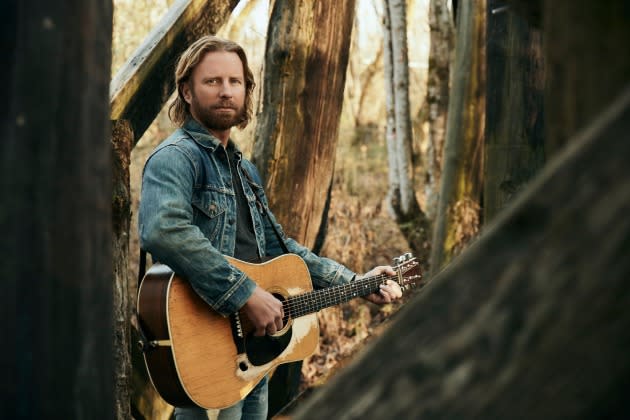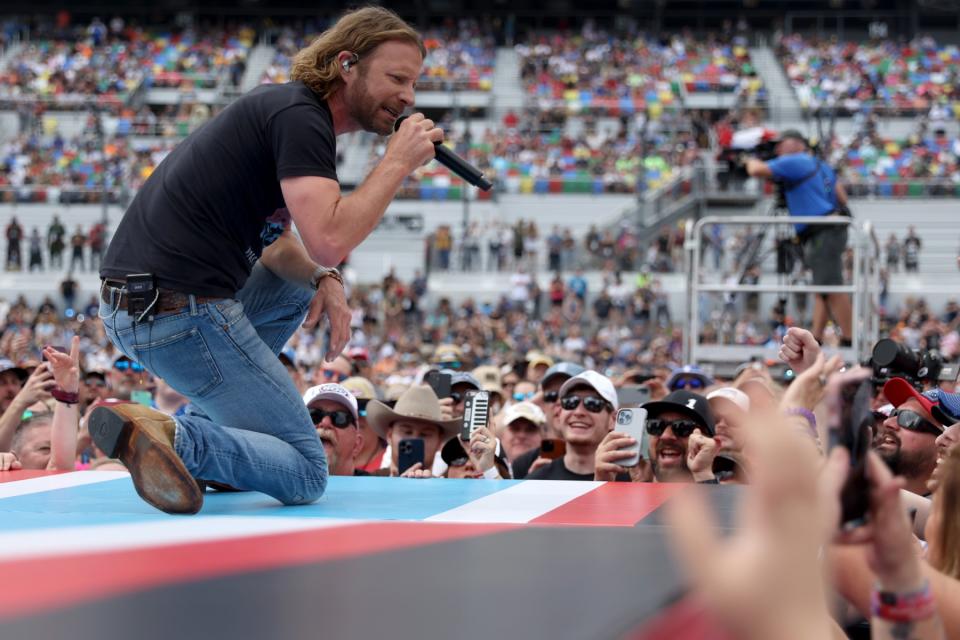Dierks Bentley Is the Crunchy, Zen Country Star Living Next Door to You

It’s the first Tuesday of the month and, as has been his standing date since October, Dierks Bentley is onstage at Nashville’s cinderblock picking parlor the Station Inn, playing bluegrass staples with his road band under the anonymous name of Long Jon. After rambunctious versions of Tony Rice’s “Cold on the Shoulder” and Ralph Stanley’s “Katy Daley,” Bentley takes off his Martin acoustic and feigns swapping instruments with fiddle player Dan Hochhalter. It’s a gag, a bit. Bentley doesn’t play fiddle. He’s a guitar strummer, but he won’t be showing off any flashy runs. “I don’t have the right pick tonight,” he jokes to the crowd, fumbling through his pockets in a vain search before throwing up his hands in resignation.
Bentley’s self-effacing jokes aside, the man knows his bluegrass. While he may not be as fleet-fingered as Molly Tuttle, who will open shows for Bentley on his summer tour, or Charlie Worsham, now a full-time member of his touring band (and Long Jon), he thrives on the mountain sound. When Bentley released his self-titled debut album 20 years ago, he closed it out with the bluegrass jam “Train Travelin’,” a collab with his heroes the Del McCoury Band. Gravel & Gold, his brand-new 10th studio album, ends with another bluegrass number, the let’s-get-stoned duet with Billy Strings, “High Note.”
More from Rolling Stone
Dierks Bentley and Breland on NASCAR and Country Music: 'If You're Not Growing, You're Dying'
Dierks Bentley Puts Nashville's Greatest Honky-Tonk on Display in 'Cowboy Boots' Video
“I hadn’t thought of that. That wasn’t a conscious decision. I mean, it’s so sad,” Bentley says the next day when I point out the similar album structures. “It’s like the same old me. We think we’re evolving so much, talking about mindfulness and all this stuff? And how pathetic… I really am just the same person. I’ve gone nowhere. You can’t escape yourself. You just are who you are.”
But Bentley hasn’t ever really tried to escape himself, especially as an artist. He’s never “chased,” as they say in Nashville writing rooms, desperate to score a hit by pandering to the latest trend. The closest he came to bro-country, the 2010s’ hot if maligned flavor, was “5-1-5-0,” and even that song holds up today, while the originators of the subgenre, Florida Georgia Line, have broken up. It’s no coincidence that the first track on Gravel & Gold is titled “Same Ol’ Me.”
“I remember reading an article way back about George Strait. Its title was ‘George Strait Is Too Straight,’ and it was like, he’s not evolving, he’s not trying different things. I remember being like, ‘But I love George Strait.’ You have to make records based on what you think is cool, right? And my sense of cool is Del McCoury and [Grand Ole Opry radio station] 650 WSM,” says Bentley, seated on the front porch of his Nashville home, which, surprisingly for a recognizable country star, is located smack dab in the middle of a highly trafficked tourist area. There’s no gate, no privacy hedges, no driveway — Bentley parks his cars on the street. “I put out cones to save my spot. I’m the cone guy.”
IF IT WEREN’T SO — and damn the overuse of this word — “authentic,” Bentley’s everydude persona would border on parody. During the course of our chat, he waves at neighbors driving by and shouts hello to gawkers. His kids’ sports equipment litters the yard. At one point, he pulls out his iPhone to show me a video of him singing his smash “Drunk on a Plane” at a yard party two doors down shortly after buying the house, sight unseen, and returning to Nashville from Telluride, Colorado, where he and his family had been riding out the pandemic.
“This neighborhood and this house is a big part of my joy of being back in Nashville,” he says. “What I had in Colorado was like this…bikes, a porch. Outdoors is where I enjoy being. This porch is my favorite room in the house.”
Bentley doesn’t just chill in nature, he actively communes with it, and not in the ultra-macho deer-stands-and-duck-blinds way of some of his peers. His connection is more spiritual. On Gravel & Gold, he devotes a trio of songs — “Sun Sets in Colorado,” “Still,” and the searching “Something Real” — to its restorative powers. While living under the radar in Telluride, he’d cut a song here and there, like 2020’s “Gone,” to keep his longtime label Capitol Nashville happy, but mostly left his guitar “in its case” and got outdoors. “What I loved about being in that town is that nobody cares about what you do,” he says. “It’s all about what you did that day: ‘Oh, we hiked this, or skied down that.’” During our conversation, he references the Buddhist monk Thich Nhat Hanh and his dharma talks about the interconnectedness of nature and living in the moment.
“He talks about when you’re washing dishes, don’t do anything else. If I’m folding laundry, I’m folding laundry. I don’t need to listen to music then. I don’t need a podcast. I don’t need a TV,” says Bentley, who adds he’s not particularly religious. “Buddhism isn’t actually a religion. Anybody can practice that. I have a lot of opinions on some of this stuff… I love Jesus, I love his teachings. But when Christianity gets used to support your cause or justify your wealth, it’s such a weird deal.”

Country music’s current mood can best be described that way too: weird. In the five years since Bentley released his last studio album, 2018’s The Mountain, and went into Rocky Mountain exile, open divisions and infighting driven by political differences and the culture wars have pock-marked the genre. Even Nashville nice guy Brad Paisley caught heat for releasing a pro-Ukraine song featuring the country’s president Volodymyr Zelensky. (John Rich tweeted a clown emoji when a follower asked what he thought of the collab.) And that’s on top of the ongoing bad blood between Jason Aldean and Maren Morris, both of whom Bentley has performed with in his career. When I suggest that we won’t be seeing those two names on a tour poster together anytime soon, Bentley nods. “No, probably not,” he says.
It all makes the 2013 spat between Luke Bryan and Zac Brown over the artistic merits of Bryan’s “That’s My Kind of Night” seem quaint.
“[What’s happening in country music] is definitely a microcosm of the country at large,” Bentley says. “There’s a lot of tension, a lot of anger, a lot of mistrust. A lot of fear being used on both sides to build their base. I want to feel like it’s maybe softening a bit, but probably not. We have our election coming up and everything’s just so divisive.”
Bentley, however, excels at bringing people together — and right when the genre needs it most. Gravel & Gold assembles old-school country songwriters like Jon Randall and Neil Thrasher with rock and pop-influenced tunesmiths like Hardy and Luke Dick. Along with the Strings cameo, there’s the exquisite duet with Ashley McBryde, “Cowboy Boots.” Bentley unifies classic sounds with contemporary phrasings too: his vocal delivery in the chorus of the LP’s first single “Gold” is rapid-fire and of the moment while mandolin and acoustic guitar summon the vintage tones of his beloved Station Inn. “There’s a conversation between the instruments that goes on underneath the vocal,” Bentley says. “I’m telling the story up here, but these guys are all communicating down here. And a lot of modern country records, they don’t do that.”
“Dierks has a long-held mantra, to mix the kick-ass with the bluegrass,” says Worsham, who played on all 14 tracks of Gravel & Gold and co-wrote “High Note.” “Throughout his long career, he’s made a slew of records that feature mandolin, banjo, Dobro, high-lonesome harmony, fiddle, steel guitar, and chicken-picked Telecasters. He has a deep respect for ‘liner note people,’ and he leans on the expertise of great musicians, great songwriters, and great producers to steer his record-making process. For a guy like me, who got into country music through the bluegrass door, it proves that you can hold on to the traditions you love and at the same time push the genre into new, exciting places.”
Bentley signaled exactly what Worsham is talking about with his very first single, 2003’s “What Was I Thinkin’.” A song about the irresistible allure of a girl in a “little white tank top,” it was radio catnip and gave Bentley his first Number One, all of it propelled by a rootsy Dobro lick that might sound foreign on today’s country radio. Two decades later, it remains a tentpole of his live shows.
“I can’t believe it’s been 20 years,” Bentley says, closing his eyes tight and shaking his head. He’s 47 now and some days he toys with the idea of hanging it up, and, like Sasquatch, retreating back into the wilderness.
That won’t happen anytime this year. Bentley just announced a major summer tour in support of Gravel & Gold, with mainstream star Jordan Davis in direct support and a rotating, eclectic mix of openers including Red Dirt outfit Shane Smith & the Saints, Alabama roots-rockers Red Clay Strays, Nashville rough-housers the Cadillac Three, and Bentley’s frequent singing partner Elle King. Despite his threats to leave the life behind, he says he loves his band too much to quit.
THAT MUCH WAS EVIDENT onstage at the Station Inn the night before, where Bentley led the seven-piece Long Jon (the name is an homage to the band’s bus driver) through the musical conversation he likes to talk so much about. Hochhalter sawed his fiddle, Worsham picked out a lead, bassist Cassady Feasby plucked at his upright bass, while Bentley strummed along and grinned — as mindfully in the moment as when he’s folding his laundry.
“I was 19 years old when I first walked in the Station Inn. And I’m still playing there all these years later,” he says afterward.
As the show ends and the fans depart, Bentley pays his band and the Station Inn’s crew — the players each get 160 bucks, he tosses the sound engineer $500, and he tips the bar handsomely. Then he hops back in his truck, drives home, and parks on the street.
Best of Rolling Stone


